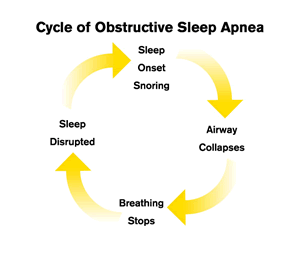A new study has shown how patients who suffer from sleep apnoea may leave themselves open to encouraging the growth of cancer tumours. The hypoxia caused by the condition results in blood vessel growth in tumours.
Sleep apnoea is a disorder whereby the patient has shallow breaths and pauses in breathing during sleep, which can last from a few seconds to a few minutes and can happen up to 30 times in an hour. This can be due to the airway becoming blocked or collapsing during sleep. Risk factors include a small upper airway, smoking, alcohol use, being overweight and having a large neck. Many patients who suffer respiratory disease also find that they suffer from sleep apnoea, especially COPD patients as a large proportion of COPD patients still continue to smoke.
Previous studies have linked sleep apnoea to an increase of death from cancer but this recent study has made the mechanisms a bit clearer. It seems that the intermittent hypoxia (reduction of oxygen in the blood available to the tissue cells) suffered by the patient during episodes of sleep apnoea encourages mechanisms that result in tumour growth. Mice that had tumours and experienced intermittent hypoxia (like with sleep apnoea) showed an increase in vascular progenitor cells and endothelial cells. These cells than can mature to create blood vessels in tumours. This increase in blood vessels within the tumour will allow the tumours to receive more oxygen and nutrients from the blood to encourage growth and for them to metastasise and spread throughout the body.
Also these mice showed an increase in levels of VEGF (vascular endothelial growth factor) which is a protein known to boost blood vessel formation. Overall the team behind the study believe that the findings indicate that sleep apnoea may worsen the outcome for cancer patients.

Dr. Vilaseca says “patients suffering from obstructive sleep apnoea usually suffer from intermittent hypoxia at night. This work shows that intermittent hypoxia has the potential to promote the formation of blood vessels within tumours, meaning that the tumours have access to more nutrients.”
Prof. Arnulf Stenzi comments that the findings are remarkable and shows how oxygen deficiency can really influence the body in many ways and especially in this case with tumours. “It may be postulated that increased oxygenation of the blood may be the underlying mechanism why not smoking or giving up smoking, regular sport activity, reducing the body mass index (BMI) and other lifestyle changes that increase tissue oxygenation have a supportive beneficial effect on better outcomes in….cell cancer.”
Further studies will be carried out as it opens up the question as to whether this only happens during sleep apnoea episodes or whether it could happen during the waking day with patients who suffer from shortness of breath with respiratory conditions such as asthma and COPD. It could make it even more vitally important that patients who suffer from conditions where blood oxygen levels drop ensure they are monitored and take their medication and supplemental oxygen regimentally both day and night to ensure that they are not risking an increase in tumour growth. Cancer can go undetected and you may not be aware that you have it but allowing your body to become hypoxic could be encouraging tumour growth; whether malignant or benign and worsening the condition and your outcome.
References: www.medicalnewstoday.com




